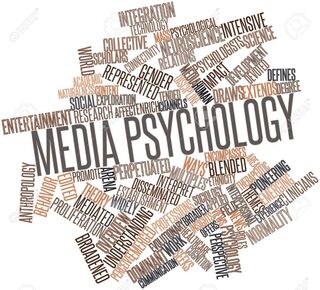Media
Media Psychology Takes Center Stage: From War Images to AI
Understanding media psychology is now important in all fields and disciplines.
Posted April 1, 2022 Reviewed by Hara Estroff Marano
Key points
- Understanding media psychology is now important in all fields and disciplines.
- Media psychology research can help lead to better domestic and global understanding of gender, race, and ethnicity.
- The media psychology of artificial intelligence is rapidly advancing and will have far-reaching social, political, legal, and ecological effects.
- There is increased opportunity and need for courses, certificates and degree programs in media psychology.

Media psychology is a multi-disciplinary field that includes the interaction, influences, and manipulated effects of information and psychology on human behavior. It is an established specialty in psychology represented in the American Psychological Association by APA Media Psychology Division 46, the Society for Media Psychology and Technology. During the past half-century, media psychology has matured as an applied specialty in research, relevant in commerce and business, healthcare, the military, education, entertainment and public policy.
Media psychologists draw upon all the theories and research in the greater field of psychology, including developmental, cognitive, and narrative perspectives. Advances in neuroscience, which make it increasingly possible to track, study and learn from brain responses using magnetic resonance imaging, also feed the knowledge base of media psychology.
The generalized field of psychology is the rudder that guides research on theories within psychology as they apply to media. This includes studying the multiple sensory responses (synesthesia) triggered by language (semantics), symbols (semiotics), pictures, video, touch, taste, smell, and sound. Sensory psychology, including visual and language communication, social cognition, and artificial intelligence are among the many diverse research areas addressed in the study of media and human behavior. Social media has exploded and is having a diverse and profound influence on human behavior. The study of all types of social media is now fundamental and important in the study of media psychology.
Worldwide communication is now streaming and expanding into an increasingly complex human-centered and screen-deep global spiderweb.

Marshall McLuhan declared that “The media is the massage, and the message is the message.” (McLuhan 1967) Information flows through streaming pipelines emitted from satellite uplinks in stationary orbit, fueling a galactic media network of interconnected devices, communicating between and among each other. Examples include high-definition televisions, computers, all variations of mobile smartphones, including watches, pins, and earphones, all of which connect users through social media in an imaginative panoply of wired and wireless telecommunication appliances. We are bombarded.
The Covid pandemic, the current war between Russia and Ukraine, global climate issues, inflation, globalization, energy, and behavioral economics require much more research and interpretation through the application of media psychology. Deeper recognition and understanding of media influences and effects is necessary to better understand the implications of crowd manipulation, including the bystander effect, on populations and their collective consciousness.
This includes the nature of herd mentality, riot behavior, crime, and all forms of manipulation specifically influenced through media. Current armed conflicts around the world are at dangerous levels. Many citizens are finding themselves bombarded to the point of sensory overload by the efforts of those trying to influence and infuse public perceptions and insights to manipulate public behavior. Researchers studying influences and conflicts in mass communication and social media analyze behavioral dilemmas and influences of all types.
Artificial intelligence is now rapidly advancing and will have far-reaching social, political, legal, and ecological effects by infusing new systems into everyday life.

Since the early 2000s, artificial intelligence (AI) has exponentially expanded as an academic field and as an industry. There have been extraordinary media innovations, from improved real-time language translation, video conferencing platforms, 3D and holographic modeling, self-driving vehicles, to the globalization of streaming services in most forms of entertainment, banking, and telehealth.
The social consequences and behavioral adaptations to AI require a deeper understanding. The European Union, for example, is pursuing the AI Act of 2021 to begin to understand the influences and effects of AI. In addition, the fields of sociology, anthropology, communication, political science, education, healthcare, and commercial business are using applications of Big Data to quantify behaviors. Media psychology adds a needed sophisticated dimension to research by qualifying the behavioral implications.
Diversity Studies. Striving for a better domestic and global understanding of gender, race and ethnicity is driving deeper and fuller understandings of central questions that can be informed by media psychology research.

Diverse media-centric research across gender, sex, race, ethnicity, generation status, religion, ideology, partisanship, and cultures are on the evolving media psychology agenda. The nature of jobs and professions is changing. Media psychology is now central in careers in government, nonprofit organizations, and industry, as well as academia. Frankly, all professions are impacted and are changing because of social media and new technologies. New, multi-disciplinary applications in media psychology are blossoming in all areas. New courses in media psychology are integrated into career education in many fields. New certificate programs are being launched in commercial, entertainment, education, healthcare, military, and public policy programs. Educating researchers and practitioners is important now.

Education and training in media psychology are now integrated as they are woven into programs in anthropology, psychology, sociology, political science, business, technology, health care, and public policy. Understanding media psychology is important in all fields and disciplines... and whether taught in modules, courses, certificate or degree programs, applying theories in media psychology makes a difference and enhances understanding.
Thucydides, author of The History of the Peloponnesian War, is reported to have said, in 432 BCE: “A nation that draws too broad a difference between its scholars and its warriors will have its thinking done by cowards and its fighting done by fools. (Warner, 1968). In primary research, and for the scholar-practitioner in 2022, media psychology has taken center stage as a field whose time is now.
Luskin Learning Psychology Series No. 62
Special thanks: Toni Luskin, Ph.D., for editorial and publishing assistance.
Please send comments or suggestions to: Bernie@LuskinInternational.com
References
Thucydides, & Rix Warner, R. (1968) History of the Peloponnesian War. Baltimore Md: Penguin Books.
McLuhan, M., Fiore, Q., & Agel, J. (1967). The Medium is the Massage. New York: Bantam Books.
Mueller, Benjamin (2021-05-04). "The Artificial Intelligence Act: A Quick Explainer". Center for Data Innovation. Retrieved 2021-11-14.




